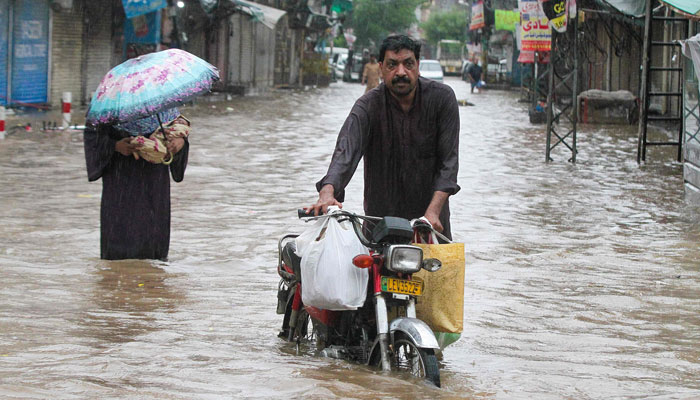Unending crisis reel
With monsoon having reared its head, Pakistan needs to invest in green energy and take measures to deal with the record-breaking rains
That Pakistan is facing multiple crises would be a huge understatement. From administrative issues to economic crises to political chaos to an increase in terrorist attacks, it seems we are caught in a vortex of crises that seems unending. And now we also have older, more systemic challenges like sectarian clashes and Baloch protests coming to the fore. The recent clashes in Parachinar over a land dispute – which has taken on sectarian hues – have claimed the lives of 49 people so far, and the protests in Gwadar, along with the heavy-handedness with which the state is dealing with them, are only adding to the country’s woes. As if these issues are not enough, the now-perpetual climate change threat is staring us right in our faces – in the latest, a 44-year record was broken as over 350mm of rainfall poured down in Lahore yesterday.
With all this going on, one would think the state would make sure its reaction calms the waters instead of making things even worse. Not so, unfortunately. Both the Parachinar law and order issue and the Baloch protests have to be handled with sensitivity and responsibility. Violence of any kind is unacceptable for a country, let alone sectarian violence in a country where we have seen how the flames of sectarianism lead to dangerous consequences. As for Balochistan, this is not the first time the Baloch have protested for their rights. This issue also needs to be handled with care. Listening to the legitimate grievances of the Baloch and sifting the real from the agenda-driven is important. This cannot happen by arresting people. The only way forward is by negotiating with protesters for their genuine and legitimate issues. It is also important that the media refrain from factually incorrect reporting on such sensitive matters, with nuance and facts being prioritized. But for that, the state needs to make sure it keeps communication networks open instead of ensuring an information blackhole which is then filled by misinformation and propaganda by all sides.
With the monsoon having reared its head, Pakistan also needs to invest in green energy and take measures to deal with the record-breaking rains, flooding and other climate change-induced natural disasters on a war footing. As for the mainstream political crisis, the government seems directionless. On the one hand, we have an opposition party that only wants to negotiate with the establishment and not with any civilian leadership, and on the other we have a government that is one day mulling banning a party and the other day inviting it to the negotiating table. The cherry on top of it all is the new clash of institutions, which cannot be fixed by coming up with laws to bulldoze Supreme Court verdicts. Instead of addressing the real issue at hand – a state beholden to elite capture and a democracy hostage to a hybrid system – the political class is busy fighting each other. The people of Pakistan are tired of being ignored, of paying an extremely high cost of living while not making enough to make ends meet, of seeing the ruling elite benefit itself, of being voiceless, of being disenfranchised – and then of being arrested when it raises its voice. It is time the government listened to the people instead of bickering over issues that do not address the grievances of the regular citizen – from the mainstream to the peripheries. Only through inclusive and empathetic governance can Pakistan hope to navigate its way out of this unending crisis reel.
-
 Winter Olympics 2026: When & Where To Watch The Iconic Ice Dance ?
Winter Olympics 2026: When & Where To Watch The Iconic Ice Dance ? -
 Melissa Joan Hart Reflects On Social Challenges As A Child Actor
Melissa Joan Hart Reflects On Social Challenges As A Child Actor -
 'Gossip Girl' Star Reveals Why She'll Never Return To Acting
'Gossip Girl' Star Reveals Why She'll Never Return To Acting -
 Chicago Child, 8, Dead After 'months Of Abuse, Starvation', Two Arrested
Chicago Child, 8, Dead After 'months Of Abuse, Starvation', Two Arrested -
 Travis Kelce's True Feelings About Taylor Swift's Pal Ryan Reynolds Revealed
Travis Kelce's True Feelings About Taylor Swift's Pal Ryan Reynolds Revealed -
 Michael Keaton Recalls Working With Catherine O'Hara In 'Beetlejuice'
Michael Keaton Recalls Working With Catherine O'Hara In 'Beetlejuice' -
 King Charles, Princess Anne, Prince Edward Still Shield Andrew From Police
King Charles, Princess Anne, Prince Edward Still Shield Andrew From Police -
 Anthropic Targets OpenAI Ads With New Claude Homepage Messaging
Anthropic Targets OpenAI Ads With New Claude Homepage Messaging -
 US Set To Block Chinese Software From Smart And Connected Cars
US Set To Block Chinese Software From Smart And Connected Cars -
 Carmen Electra Says THIS Taught Her Romance
Carmen Electra Says THIS Taught Her Romance -
 Leonardo DiCaprio's Co-star Reflects On His Viral Moment At Golden Globes
Leonardo DiCaprio's Co-star Reflects On His Viral Moment At Golden Globes -
 SpaceX Pivots From Mars Plans To Prioritize 2027 Moon Landing
SpaceX Pivots From Mars Plans To Prioritize 2027 Moon Landing -
 J. Cole Brings Back Old-school CD Sales For 'The Fall-Off' Release
J. Cole Brings Back Old-school CD Sales For 'The Fall-Off' Release -
 King Charles Still Cares About Meghan Markle
King Charles Still Cares About Meghan Markle -
 GTA 6 Built By Hand, Street By Street, Rockstar Confirms Ahead Of Launch
GTA 6 Built By Hand, Street By Street, Rockstar Confirms Ahead Of Launch -
 Funeral Home Owner Sentenced To 40 Years For Selling Corpses, Faking Ashes
Funeral Home Owner Sentenced To 40 Years For Selling Corpses, Faking Ashes




